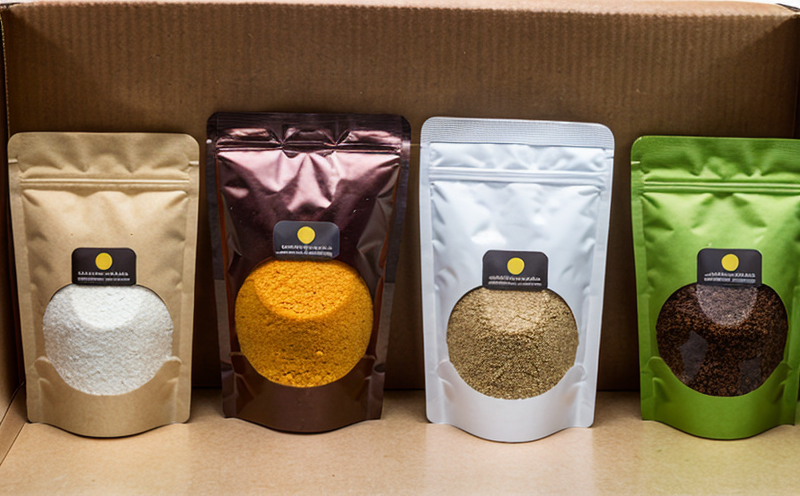Heavy Metal Testing in Recycled Food Contact Materials
In the realm of consumer products and product safety testing, ensuring the safety of materials that come into contact with food is paramount. This necessity extends to recycled food contact materials (RFCMs), which are increasingly being used due to their cost-effectiveness and sustainability benefits. However, the presence of heavy metals in these recycled materials can pose significant risks if not properly controlled.
Heavy metal testing for RFCMs involves a series of meticulous procedures designed to detect the presence of harmful elements such as lead, cadmium, mercury, and arsenic. These tests are critical because even trace amounts of heavy metals can leach into food products, leading to potential health hazards. The importance of these tests cannot be overstated, especially given consumer safety regulations that mandate compliance.
The testing process begins with the selection of appropriate samples for analysis. This involves careful preparation to ensure accuracy and reliability. Once prepared, the samples undergo a series of analytical procedures using advanced instrumentation such as Inductively Coupled Plasma Mass Spectrometry (ICP-MS) and Flame Atomic Absorption Spectroscopy (FAAS). These methods provide precise and accurate quantification of heavy metal concentrations.
The selection of appropriate standards is crucial. International standards like ISO 21950:2018, which specifies the method for the determination of metals in plastic materials used as food contact surfaces, are often referenced. Compliance with these standards not only ensures legal adherence but also builds consumer trust.
After testing, detailed reports are generated, providing comprehensive data on the levels of heavy metals detected. This information is vital for manufacturers to make informed decisions about material sourcing and processing. It also serves as a critical tool for regulatory compliance and quality assurance.
The impact of heavy metal testing in RFCMs extends beyond mere compliance; it plays a pivotal role in enhancing product safety and public health. By identifying and mitigating potential risks, manufacturers can ensure that their products meet or exceed the highest standards of safety and reliability.
In conclusion, heavy metal testing is an indispensable component of ensuring the safety of recycled food contact materials. It underscores the importance of rigorous quality control measures in consumer product development and production processes.
Applied Standards
| Standard | Description |
|---|---|
| ISO 21950:2018 | Method for the determination of metals in plastic materials used as food contact surfaces. |
| ASTM E1686-20 | Determination of Metals in Polyethylene and Polypropylene Film Packaging. |
| EN 973:2005 | Determination of Metallic Elements in Polymers by Inductively Coupled Plasma Spectrometry (ICP). |
| IEC 61967-48 | Test methods for the determination of metallic elements in polymers. |
Industry Applications
The application of heavy metal testing is particularly relevant in sectors where recycled materials are used extensively. This includes the food and beverage industry, pharmaceuticals, and even personal care products. The testing ensures that these materials do not introduce harmful elements into the final product.
For instance, in the food packaging industry, RFCMs are used to create containers and wraps for food items. Testing these materials helps manufacturers ensure they meet safety standards before they reach consumers. This process is especially crucial when dealing with sensitive products like baby formula or medications that could be affected by even trace amounts of heavy metals.
The pharmaceutical sector also benefits significantly from this testing. Packaging used in the storage and transport of medicines must not only be safe but also ensure the integrity of the product. By adhering to strict testing protocols, companies can prevent any contamination or degradation that could compromise the efficacy of their products.
In summary, heavy metal testing is a cornerstone for ensuring the safety and quality of materials used in contact with food and other sensitive products. This testing process is essential across various industries where recycled materials are utilized to ensure they meet stringent regulatory requirements.
Environmental and Sustainability Contributions
The use of recycled food contact materials (RFCMs) represents a significant step towards reducing waste in the packaging industry. By reusing post-consumer plastics, manufacturers are able to extend the lifecycle of these resources, thereby minimizing environmental impact. However, it is crucial that these materials undergo rigorous testing for heavy metals to ensure they do not pose risks.
Heavy metal testing plays a vital role in this sustainability effort by identifying and eliminating potential hazards associated with RFCMs. By ensuring that recycled materials are free from harmful elements, companies can promote safer products while also contributing positively to environmental conservation efforts. This approach supports the broader goal of reducing waste and encouraging the use of sustainable practices.
Moreover, heavy metal testing helps in optimizing recycling processes by identifying problematic materials early in the supply chain. This allows for more targeted interventions, ensuring that only safe and reliable RFCMs are used in production. By doing so, companies can enhance their reputation as leaders in sustainability and environmental responsibility.
In conclusion, the importance of heavy metal testing cannot be overstated in the context of recycled food contact materials. It not only ensures product safety but also aligns with broader sustainable practices that benefit both consumers and the environment.





